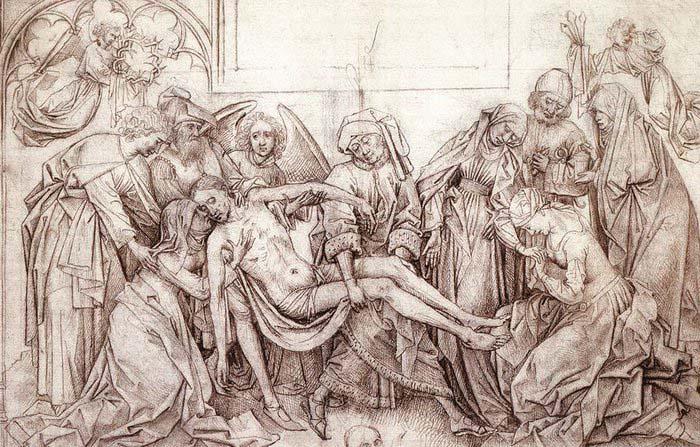New Crafts International LLC Europe
WEYDEN, Rogier van der
Descent from the Cross
Pintura Identificación: 63879
1460 Pen over chalk drawing on paper, 240 x 357 mm Mus?e du Louvre, Paris Paintings in the style of Rogier van der Weyden that are no longer extant are also recorded in several drawings not from the workshop of the Brussels town painter. Among the most notable is this Descent from the Cross, frequently said to derive from an original by Rogier himself, and sometimes even ascribed to Robert Campin. Surrounded by Christ's mourning friends, Joseph of Arimathea and Nicodemus are carrying the body just taken down from the Cross to the tomb. The very unusual outer area, with raised sections at the sides where angels hover with the nails and the crown of thorns, may refer to the place where the painting connected with this drawing was installed - perhaps it was to be placed below a tall window. The composition obviously appealed to contemporary taste, and was copied in painting and sculpture several times. It shares important elements with Rogier's most influential work, the Deposition (Prado, Madrid): there are considerable similarities in the construction of the scene, which again is transferred to an altar shrine, and in some of the figures, particularly those of the bearded Joseph of Arimathea and Mary Magdalene. The Virgin Mary and the flying angels, on the other hand, are more like the corresponding figures in the Crucifixion Triptych (Kunsthistorisches Museum, Vienna), and the figure of St John resembles his counterpart in the Seven Sacraments Altarpiece (Museum of Fine Arts, Antwerp). However, while in a work like the St Columba Altarpiece (Alte Pinakothek, Munich) the figures, taken from various different pre-existing models, are merged into a meaningful whole, there are discrepancies in the Descent from the Cross. Joseph of Arimathea seems to be standing still as he holds the corpse, but the legs of Nicodemus suggest that he is walking away, an action that clashes with the Virgin's heartfelt embrace of Christ. And the Magdalene is obviously shown twice, as the woman with the vessel of ointment - the saint's attribute - standing on the extreme right, veiled as in the Crucifixion Triptych, and as the figure of the Magdalene from the Deposition, identifiable as the former sinner by her low-cut, expensive dress. These inconsistencies cannot be reconciled with Rogier's careful, confident style, and the drawing cannot therefore be considered a copy from a work conceived by him. In fact it is not yet clear whether it is a copy at all, or whether it may be a sketch for a design.Artist:WEYDEN, Rogier van der Title: Descent from the Cross Painted in 1401-1450 , Flemish - - graphics : study

Vea nuestra galería en Suecia







